CAN MANDATORY DIVIDEND POLICY REDUCE THE AGENCY COST OF LISTED COMPANIES? MODEL ANALYSIS AND EMPIRICAL TEST IN CHINA
DOI:
https://doi.org/10.12775/CJFA.2019.003Słowa kluczowe
mandatory dividend, agency cost, dividend policy, mixed strategy equilibrium, difference-in-difference modelAbstrakt
In this research, the mixed strategy complete information static game was adopted to explain the effect of mandatory dividend policy on agency cost, and Chinese mandatory dividend policy introduced in 2011was regarded as the institutional background, and whether mandatory dividend policy can reduce the agency cost of listed companies as an accidental impact was studied. Empirical test indicates that mandatory dividend policy significantly inhibits the agency cost of enterprises. Further research finds that the mandatory dividend policy has a better effect on reducing agency costs for the companies listed on the main board and those with normal dividends, while it has no significant effect on restraining agency costs for the companies with micro-dividends and small and medium-sized boards. The study supports the dividend agency cost theory and provides empirical evidence for the regulating departments to improve the follow-up policy of capital market governance.Bibliografia
Bao, Y., & Tianrong, Y. (2014). Intervention of Institutional Investors, Agency Problem and Corporate Dividend. Journal of Shanxi University of Finance and Economics, 36(06), 90–101.
Bao, Y., Wanwei, & Chow, D. (2018). Cash Dividend Distribution under R&D Investment Decision: Suppression or Catering. Also on the Paradox of Regulation of “Semi-compulsory Dividend Policy”. Journal of Shanxi University of Finance and Economics, 40(03), 94–109.
Bao, Y., & Tianrong, Y. (2014). Intervention of Institutional Investors, Agency Problem and Corporate Dividend. Journal of Shanxi University of Finance and Economics, 36(06), 90–101.
Changqing, L., Zhihua, W., & Shinong, W. (2010). Market Response to Semi-compulsory Dividend Policy. Economic Research, 45(03), 144–155.
Genfu, F., & Juehang, Z. (2012). Manager’s Compensation, On-the-job Consumption and Corporate Performance: From the Perspective of Cooperative Game Analysis. China’s Industrial Economy, 06, 147–158.
Guojie, Y., & Yuyu, Z. (2018). Semi-mandatory Dividend Sharing Policy and Earnings Management of Refinancing Enterprises: Evidence from PSM. Journal of Nanjing Audit University, 15(05), 75–85; 93.
Guoling, Q. (2014). Semi-mandatory Dividend Sharing Policy, Adverse Selection and Dividend Tunneling. Investment Research, 33(10), 118–131.
Guoling, Q., Huan, L., & Ziwei, Z. (2017). The Paradox of Cash Dividend Policy of GEM Listed Companies: An Explanation Based on Dividend Tunneling Theory. China’s Economic Issues, 02, 68–79.
Hanming, Y. (2008). Empirical analysis of equity concentration, cash dividend and enterprise value. Financial Economy, 08, 67–72.
Haoran, X., & Guanmin, L. (2018). The Corporate Governance Function of Dividends: An Empirical Test Based on Compulsory Dividends of Central Enterprises. Journal of Central University of Finance and Economics, 04, 53–62.
Jing, L., & Debo, J. (2017). Demand for refinancing, regulatory pressure and cash dividend. Audit and Economic Research, 32(02), 88–97.
Juanjuan, H., & Yifeng, S. (2007). Who does the dividend policy of listed companies cater to? Empirical data from Chinese listed companies. Accounting research, 08, 36–43; 95.
Lili, Z. (2018). The Role of Major Shareholders in Directional Additional Issuance and Acquisition: Support or Benefit Transfer: An Empirical Study Based on the Merger and Acquisition of Non-listed Companies by Listed Companies. Journal of Shanxi University of Finance and Economics, 40(07), 82–97.
Modigliani, F., & Miller, M.H. (1961). Dividend policy, growth, and the valuation of shares. Journal of Business, 34(4), 411–433.
Qingsong, A. (2012). Study on the Present Situation and Trend of Dividend Sharing of Chinese Listed Companies. Stock Market Report, 11, 15–19.
Tao, Z., & Deyou, W. (2007). Cash Dividend: Mitigating Agency Problem or Major Shareholder Exploitation: A Study from the Perspective of Final Ownership Structure. Journal of Shanxi University of Finance and Economics, 08, 97–102.
Xing, L., Weirong, T., & Ning, L. (2016). Semimandatory Dividend Policy, Corporate Governance and Cash Dividend Policy. Nankai Management Review, 19(05), 104–114.
Yaoting, H., & Mahong (2017). Agency Cost, Semi-mandatory Dividend and Corporate Value: Empirical Evidence from Chinese A-share Listed Companies. Journal of Guizhou University of Finance and Economics, (04),76–83.
Yan, C., Xin, L., & Mengshun, L. (2015). Research on the Effectiveness of Semi-mandatory Dividend Policy from the Perspective of Cash Dividend Catering, Refinancing Demand and Enterprise Investment-Investment Efficiency. Accounting Research, 11, 69–75; 97.
Yan, Y., & Chunfei, W. (2014). Economic consequences and potential problems associated with refinancing and dividend policy. China Accounting Review, 12(01), 43–66.
Yi, Y., & Yifeng, S. (2004). Cash Dividend: Transferring Profit Signal or Supervising Governance Function. China Accounting Review, 01, 61–76.
Yinguo, L. (2008). An Empirical Study on Dividend Policy Effectiveness of Listed Companies in China. Economic Management, 14, 26–33.
Yinguo, L., Chen, Z., & Sumei, R. (2014). Research on the Effect of Agency Cost Control of Cash Dividend Based on Semi-mandatory Dividend Sharing. Audit and Economic Research, 29(05), 59–68.
Yunling, C. (2014). Study on the Implementation Effect of Semi-compulsory Dividend Policy. Financial Research, 08, 162–177.
Yinguo, L., Chen, Z., & Sumei, R. (2014). Research on agency cost control effect of cash dividend based on semi-mandatory dividend distribution. Audit and economic research, 29(05), 59–68.
Yong, S., & Sihao, L. (2018). Research on Related Party Transactions, Heterogeneity of Institutional Investors and Risk of Stock Market Crash. China Soft Science, 04, 123– 131.
Zhihua, W., Yuhui, W., & Changqing, L. (2012). Institutional Investor Ownership and Cash Dividend Policy of Chinese Listed Companies. Stock Market Report, 10, 40–47; 60.
Zhihua, W., Maoliang, L., & Changqing, L. (2014). Semi-compulsory Dividend policy and Dividend-sharing Behavior of Chinese Listed Companies. Economic Research, 49(06), 100–114.
Zhihua, W., Changqing, L., Yuhui, W., & Jiajia, H. (2017). Semi-mandatory policy, refinancing motivation and classical dividend theory: Empirical research based on dividend agency theory and signal theory. Accounting Research, 07, 55–61; 97.
Zhiqiang, W., & Weiting, Z. (2012). Financial flexibility, refinancing options and dividend catering strategies of listed companies. Management World, 07, 151–163.
Zuoping, X., & Zhongqin, S. (2012). Is cash dividend a tool of “tunneling” or a mask of “tunneling”? Empirical evidence from Chinese listed companies. Journal of Management Engineering, 26(02), 77–84.
Pobrania
Opublikowane
Jak cytować
Numer
Dział
Statystyki
Liczba wyświetleń i pobrań: 1231
Liczba cytowań: 0



